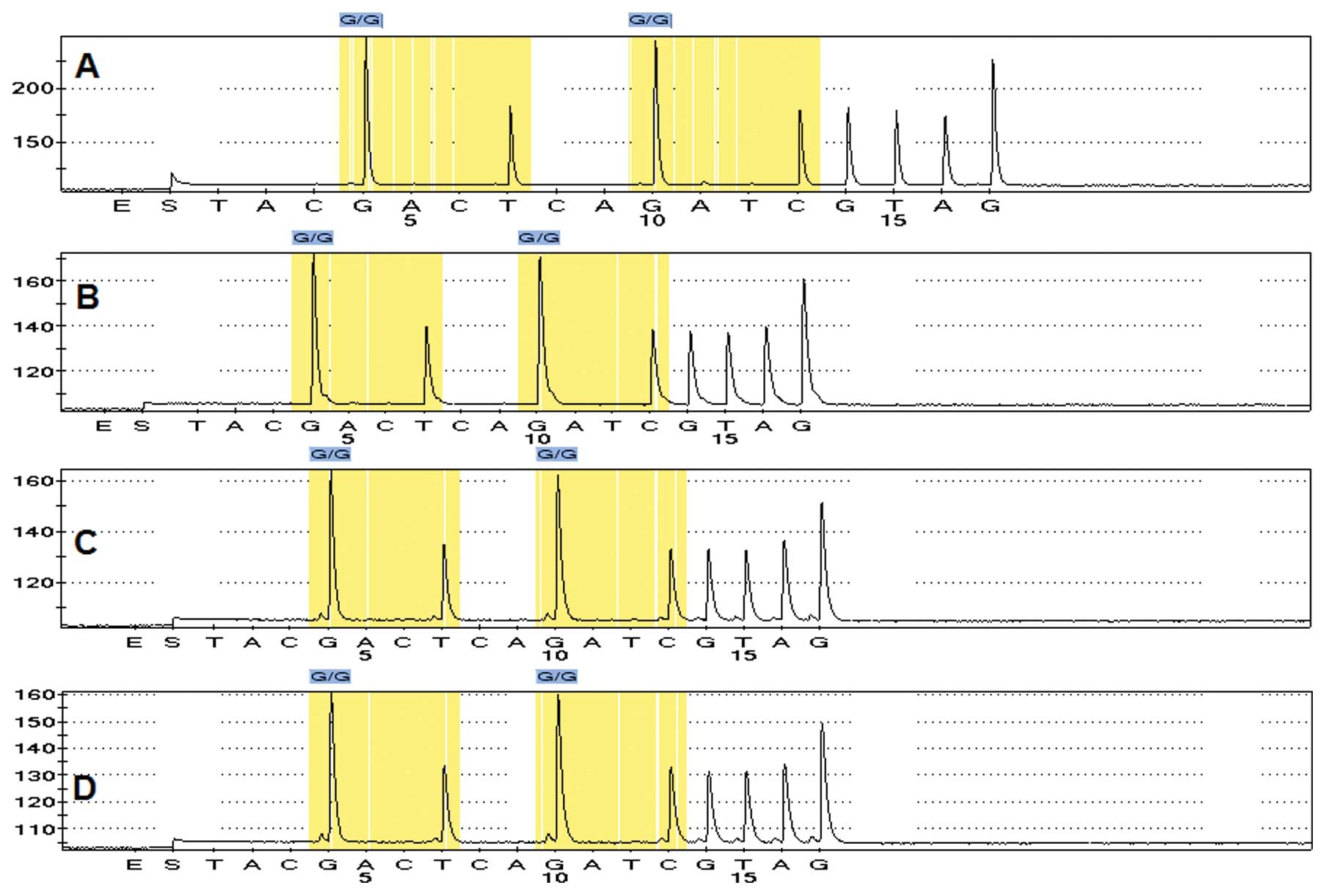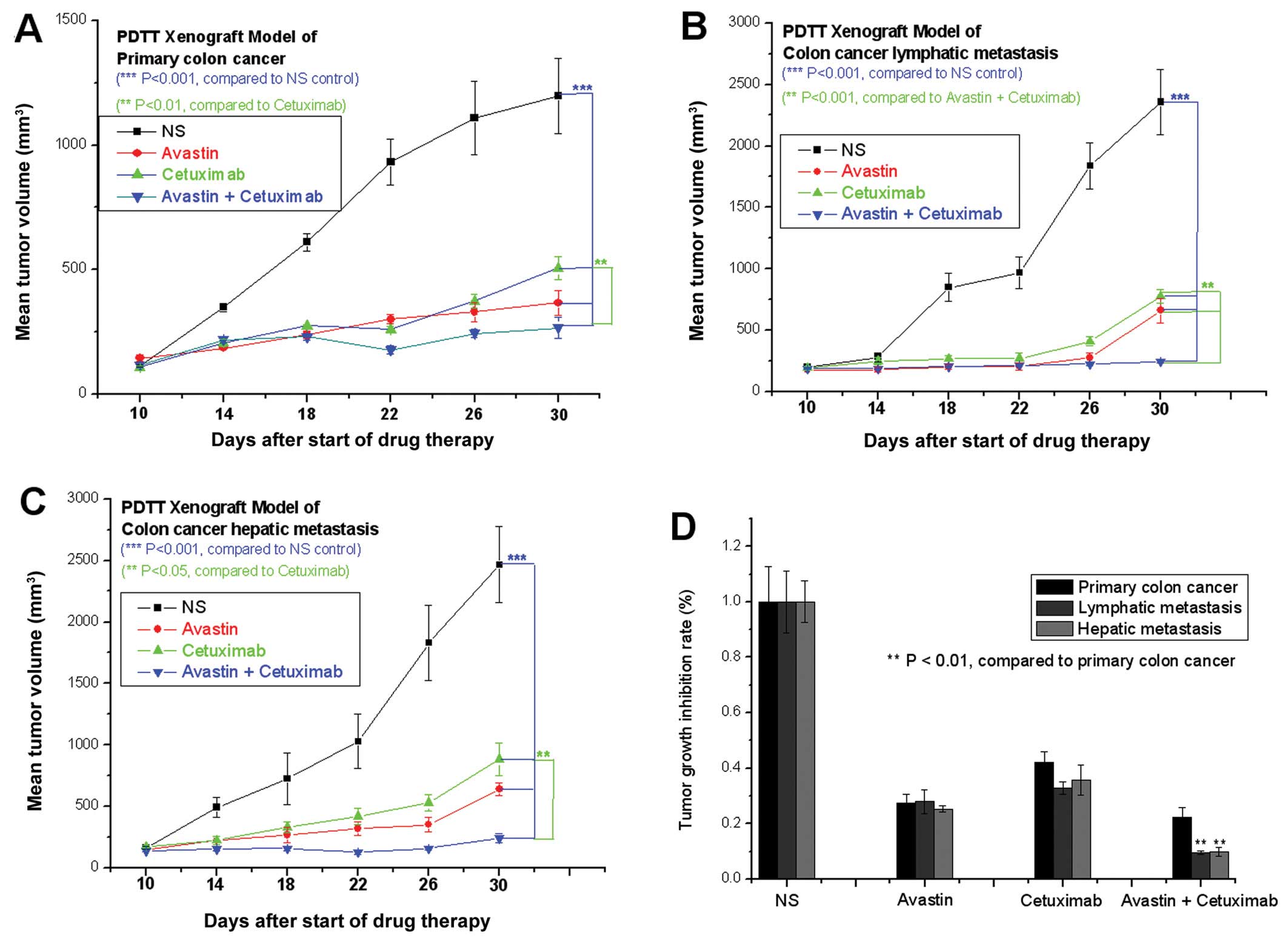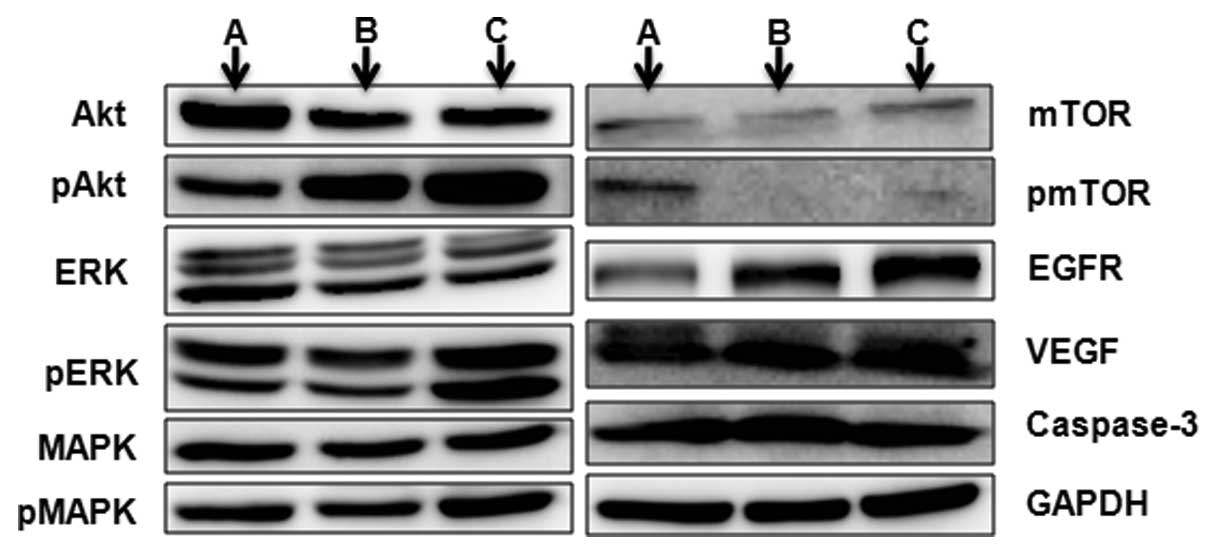|
1
|
Jin KT, He KF, Teng F, Han N, Li GL, Xu ZZ
and Teng LS: Heterogeneity in primary tumors and corresponding
metastases: could it provide us with any hints to personalize
cancer therapy? Pers Med. 8:175–182. 2011. View Article : Google Scholar
|
|
2
|
Gong Y, Booser DJ and Sneige N: Comparison
of HER-2 status determined by fluorescence in situ hybridization in
primary and metastatic breast carcinoma. Cancer. 103:1763–1769.
2005. View Article : Google Scholar : PubMed/NCBI
|
|
3
|
Gancberg D, Di Leo A, Cardoso F, Rouas G,
Pedrocchi M, Paesmans M, Verhest A, Bernard-Marty C, Piccart MJ and
Larsimont D: Comparison of HER-2 status between primary breast
cancer and corresponding distant metastatic sites. Ann Oncol.
13:1036–1043. 2002. View Article : Google Scholar : PubMed/NCBI
|
|
4
|
Regitnig P, Schippinger W, Lindbauer M,
Samonigg H and Lax SF: Change of HER-2/neu status in a subset of
distant metastases from breast carcinomas. J Pathol. 203:918–926.
2004. View Article : Google Scholar : PubMed/NCBI
|
|
5
|
Bozzetti C, Personeni N, Nizzoli R, Guazzi
A, Flora M, Bassano C, Negri F, Martella E, Naldi N, Franciosi V
and Cascinu S: HER-2/neu amplification by fluorescence in situ
hybridization in cytologic samples from distant metastatic sites of
breast carcinoma. Cancer. 99:310–315. 2003. View Article : Google Scholar : PubMed/NCBI
|
|
6
|
Tanner M, Järvinen P and Isola J:
Amplification of HER-2/neu and topoisomerase IIalpha in primary and
metastatic breast cancer. Cancer Res. 61:5345–5348. 2001.PubMed/NCBI
|
|
7
|
Tapia C, Savic S, Wagner U, et al: HER2
gene status in primary breast cancers and matched distant
metastases. Breast Cancer Res. 9:R312007. View Article : Google Scholar : PubMed/NCBI
|
|
8
|
Akcakanat A, Sahin A, Shaye AN, Velasco MA
and Meric-Bernstam F: Comparison of Akt/mTOR signaling in primary
breast tumors and matched distant metastases. Cancer.
112:2352–2358. 2008. View Article : Google Scholar : PubMed/NCBI
|
|
9
|
Wu JM, Fackler MJ, Halushka MK, et al:
Heterogeneity of breast cancer metastases: comparison of
therapeutic target expression and promoter methylation between
primary tumors and their multifocal metastases. Clin Cancer Res.
14:1938–1946. 2008. View Article : Google Scholar
|
|
10
|
Baldus SE, Schaefer KL, Engers R, Hartleb
D, Stoecklein NH and Gabbert HE: Prevalence and heterogeneity of
KRAS, BRAF, and PIK3CA mutations in primary colorectal
adenocarcinomas and their corresponding metastases. Clin Cancer
Res. 16:790–799. 2010. View Article : Google Scholar : PubMed/NCBI
|
|
11
|
Molinari F, Martin V, Saletti P, De Dosso
S, Spitale A, Camponovo A, Bordoni A, Crippa S, Mazzucchelli L and
Frattini M: Differing deregulation of EGFR and downstream proteins
in primary colorectal cancer and related metastatic sites may be
clinically relevant. Br J Cancer. 100:1087–1094. 2009. View Article : Google Scholar : PubMed/NCBI
|
|
12
|
Scartozzi M, Bearzi I, Berardi R,
Mandolesi A, Fabris G and Cascinu S: Epidermal growth factor
receptor (EGFR) status in primary colorectal tumors does not
correlate with EGFR expression in related metastatic sites:
implications for treatment with EGFR-targeted monoclonal
antibodies. J Clin Oncol. 22:4772–4778. 2004. View Article : Google Scholar
|
|
13
|
Scartozzi M, Bearzi I, Berardi R,
Mandolesi A, Pierantoni C and Cascinu S: Epidermal growth factor
receptor (EGFR) downstream signalling pathway in primary colorectal
tumours and related metastatic sites: optimising EGFR-targeted
treatment options. Br J Cancer. 97:92–97. 2007. View Article : Google Scholar
|
|
14
|
Sasatomi E, Finkelstein SD, Woods JD,
Bakker A, Swalsky PA, Luketich JD, Fernando HC and Yousem SA:
Comparison of accumulated allele loss between primary tumor and
lymph node metastasis in stage II non-small cell lung carcinoma:
implications for the timing of lymph node metastasis and prognostic
value. Cancer Res. 62:2681–2689. 2002.PubMed/NCBI
|
|
15
|
Park S, Holmes-Tisch AJ, Cho EY, et al:
Discordance of molecular biomarkers associated with epidermal
growth factor receptor pathway between primary tumors and lymph
node metastasis in non-small cell lung cancer. J Thorac Oncol.
4:809–815. 2009. View Article : Google Scholar : PubMed/NCBI
|
|
16
|
Li Z, Jin K, Lan H and Teng L:
Heterogeneity in primary colorectal cancer and its corresponding
metastases: a potential reason of EGFR-targeted therapy failure?
Hepatogastroenterology. 58:411–416. 2011.PubMed/NCBI
|
|
17
|
Jin K, Li G, Cui B, et al: Assessment of a
novel VEGF targeted agent using patient-derived tumor tissue
xenograft models of colon carcinoma with lymphatic and hepatic
metastases. PLoS One. 6:e283842011. View Article : Google Scholar : PubMed/NCBI
|
|
18
|
Jin K, Teng L, Shen Y, He K, Xu Z and Li
G: Patient-derived human tumour tissue xenografts in
immunodeficient mice: a systematic review. Clin Transl Oncol.
12:473–480. 2010. View Article : Google Scholar : PubMed/NCBI
|
|
19
|
Jin KT, He KF, Li GL and Teng LS:
Personalized cancer therapy using a patient-derived tumor tissue
xenograft model: a translational field worthy of exploring further?
Pers Med. 7:597–606. 2010. View Article : Google Scholar
|
|
20
|
Jin K, He K, Han N, Li G, Wang H, Xu Z,
Jiang H, Zhang J and Teng L: Establishment of a PDTT xenograft
model of gastric carcinoma and its application in personalized
therapeutic regimen selection. Hepatogastroenterology.
58:1814–1822. 2011.PubMed/NCBI
|
|
21
|
Ogino S, Kawasaki T, Brahmandam M, Yan L,
Cantor M, Namgyal C, Mino-Kenudson M, Lauwers GY, Loda M and Fuchs
CS: Sensitive sequencing method for KRAS mutation detection by
Pyrosequencing. J Mol Diagn. 7:413–421. 2005. View Article : Google Scholar : PubMed/NCBI
|
|
22
|
Huynh H, Chow PK, Ooi LL and Soo KC: A
possible role for insulin-like growth factor-binding protein-3
autocrine/paracrine loops in controlling hepatocellular carcinoma
cell proliferation. Cell Growth Differ. 13:115–122. 2002.
|
|
23
|
Rubio-Viqueira B, Jimeno A, Cusatis G, et
al: An in vivo platform for translational drug development in
pancreatic cancer. Clin Cancer Res. 12:4652–4661. 2006. View Article : Google Scholar : PubMed/NCBI
|
|
24
|
Perez-Soler R, Kemp B, Wu QP, Mao L, Gomez
J, Zeleniuch-Jacquotte A, Yee H, Lee JS, Jagirdar J and Ling YH:
Response and determinants of sensitivity to paclitaxel in human
non-small cell lung cancer tumors heterotransplanted in nude mice.
Clin Cancer Res. 6:4932–4938. 2000.PubMed/NCBI
|
|
25
|
Cunningham D, Humblet Y, Siena S, Khayat
D, Bleiberg H, Santoro A, Bets D, Mueser M, Harstrick A, Verslype
C, Chau I and Van Cutsem E: Cetuximab monotherapy and cetuximab
plus irinotecan in irinotecan-refractory metastatic colorectal
cancer. N Engl J Med. 351:337–345. 2004. View Article : Google Scholar : PubMed/NCBI
|
|
26
|
Saltz LB, Meropol NJ, Loehrer PJ Sr,
Needle MN, Kopit J and Mayer RJ: Phase II trial of cetuximab in
patients with refractory colorectal cancer that expresses the
epidermal growth factor receptor. J Clin Oncol. 22:1201–1208. 2004.
View Article : Google Scholar : PubMed/NCBI
|
|
27
|
Amado RG, Wolf M, Peeters M, et al:
Wild-type KRAS is required for panitumumab efficacy in patients
with metastatic colorectal cancer. J Clin Oncol. 26:1626–1634.
2008. View Article : Google Scholar : PubMed/NCBI
|
|
28
|
Cappuzzo F, Varella-Garcia M, Finocchiaro
G, et al: Primary resistance to cetuximab therapy in EGFR
FISH-positive colorectal cancer patients. Br J Cancer. 99:83–89.
2008. View Article : Google Scholar : PubMed/NCBI
|
|
29
|
Moroni M, Veronese S, Benvenuti S,
Marrapese G, Sartore-Bianchi A, Di Nicolantonio F, Gambacorta M,
Siena S and Bardelli A: Gene copy number for epidermal growth
factor receptor (EGFR) and clinical response to anti-EGFR treatment
in colorectal cancer: a cohort study. Lancet Oncol. 6:279–286.
2005. View Article : Google Scholar : PubMed/NCBI
|
|
30
|
Benvenuti S, Sartore-Bianchi A, Di
Nicolantonio F, Zanon C, Moroni M, Veronese S, Siena S and Bardelli
A: Oncogenic activation of the RAS/RAF signaling pathway impairs
the response of metastatic colorectal cancers to anti-epidermal
growth factor receptor antibody therapies. Cancer Res.
67:2643–2648. 2007. View Article : Google Scholar
|
|
31
|
Foekens JA, Peters HA, Grebenchtchikov N,
Look MP, Meijer-van Gelder ME, Geurts-Moespot A, van der Kwast TH,
Sweep CG and Klijn JG: High tumor levels of vascular endothelial
growth factor predict poor response to systemic therapy in advanced
breast cancer. Cancer Res. 61:5407–5414. 2001.PubMed/NCBI
|
|
32
|
Gasparini G, Toi M, Gion M, et al:
Prognostic significance of vascular endothelial growth factor
protein in node-negative breast carcinoma. J Natl Cancer Inst.
89:139–147. 1997. View Article : Google Scholar : PubMed/NCBI
|
|
33
|
Konecny GE, Meng YG, Untch M, et al:
Association between HER-2/neu and vascular endothelial growth
factor expression predicts clinical outcome in primary breast
cancer patients. Clin Cancer Res. 10:1706–1716. 2004. View Article : Google Scholar
|
|
34
|
Linderholm B, Grankvist K, Wilking N,
Johansson M, Tavelin B and Henriksson R: Correlation of vascular
endothelial growth factor content with recurrences, survival, and
first relapse site in primary node-positive breast carcinoma after
adjuvant treatment. J Clin Oncol. 18:1423–1431. 2000.
|
|
35
|
Gasparini G, Toi M, Miceli R, et al:
Clinical relevance of vascular endothelial growth factor and
thymidine phosphorylase in patients with node-positive breast
cancer treated with either adjuvant chemotherapy or hormone
therapy. Cancer J Sci Am. 5:101–111. 1999.
|
|
36
|
Verschraegen CF, Arias-Pulido H, Lee SJ,
et al: Phase IB study of the combination of docetaxel, gemcitabine,
and bevacizumab in patients with advanced or recurrent soft tissue
sarcoma: the Axtell regimen. Ann Oncol. 23:785–790. 2012.
View Article : Google Scholar : PubMed/NCBI
|



















